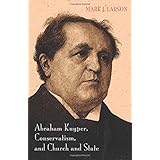
I was disappointed with Mark J.
Larson's "Abraham Kuyper, Conservatism, and Church and State" (Wipf & Stock 2015) . Even at its brief ninety-seven pages, it is a long
read. Foregoing a full review, I will note a few problems.
First, I found little evidence that Larson was
deeply acquainted with the full corpus of Kuyper's published works. He
repeatedly cites to Kuyper's Lectures on Calvinism and
occasionally to other of his works as they appear in Abraham
Kuyper: A Centennial Reader (Eerdmans 1998). Larson cherry picks from the cherry
pickings to support his not-too-subtle thesis that Ronald Reagan remains the
greatest of America's political conservatives. Larson's agenda-driven use of
sources brought to mind Benjamin Cardozo's observation
about six styles of legal writing:
There is the type magisterial or imperative; the type laconic or sententious; the type conversational or homely; the type refined or artificial, smelling of the lamp, verging at times upon preciosity or euphemism; the demonstrative or persuasive; and finally the type tonsorial or agglutinative, so called from the shears and the paste-pot which are its implements and emblem.
Larson’s “Abraham Kuyper” is the latter.
Second, and perhaps more problematic, is
Larson’s definition of conservatism. It is combination of Classical Liberalism
(see one of my articles here) and free market economics. For most Americans this is conservatism
but it’s a bit anachronistic to identify it with Abraham Kuyper. In this
respect Kuyper himself was a transitional figure. He was most definitely not a
conservative as the term was understood in his own day. He was a Liberal. And,
in that sense, Larson is correct to find in the American Founders one strand of
Kuyper’s political philosophy a century later. But only one strand.
For an American
audience, Kuyper was quick to pick up on his affinity for the Founders but, as
James Bratt has observed, Kuyper’s understanding of them was second-hand.
For his Dutch audience (and voters), Kuyper was much more communitarian and
advocated the sorts of labor law reforms that would have made late-nineteenth
century Republicans blanch and contemporary ones call him a RINO.
(And folks on the other side of the pond call him a Red
Tory.)
More could be said but won’t. With regret, I
cannot recommend “Abraham Kuyper.”




No comments:
Post a Comment